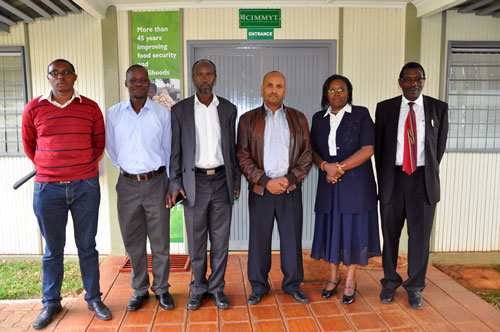By Florence Sipalla/CIMMYT
CIMMYT and Kenya’s Egerton University have agreed to strengthen their research collaboration, policy formulation and data sharing and to engage more graduate students in data analysis as part of the Adoption Pathways (AP) project. “This will accelerate the use of data sets to quickly produce products,” said Menale Kassie, CIMMYT socioeconomist, who is also the AP project leader.
Through AP, CIMMYT is partnering with universities in Ethiopia, Kenya, Malawi, Mozambique and Tanzania to identify the incentives and constraints to farmers’ adoption of new techniques in maize-legume systems. The project is funded by the Australian International Food Security Research Centre (AIFSRC) and managed by the Australian Centre for International Agricultural Research (ACIAR).

The enhanced collaboration between CIMMYT and Egerton was discussed at a meeting held at the CIMMYT-Nairobi office on 24 April and attended by Professor James Tuitoek, vice chancellor at Egerton; Professor Gideon Obare, the AP national coordinator in Kenya and a lecturer at the university; and Mary Mathenge, director of the Tegemeo Institute of Public Policy and Development, a policy think tank of Egerton University based in Nairobi.
Senior staff from Tegemeo, which specializes in agricultural policy formulation backed by data, will supervise the graduate students in collaboration with CIMMYT, Tuitoek said. The two institutions train young economists pursuing postgraduate degrees, and research on maize is a major component of their socioeconomic studies. “Almost 50 percent of Tegemeo’s research has been on maize policy,” said Mathenge. “It is often difficult to showcase the value of economic research to policymakers because it is an intangible product – it is not like a new seed variety, for example,” said Kassie. Despite that challenge, Kassie is confident that the partnership with Tegemeo will be mutually beneficial. “If we work with Tegemeo, who already have established ways of packaging research outcomes from economics studies, then we can have a far greater impact from the work we do.”
 Innovations
Innovations